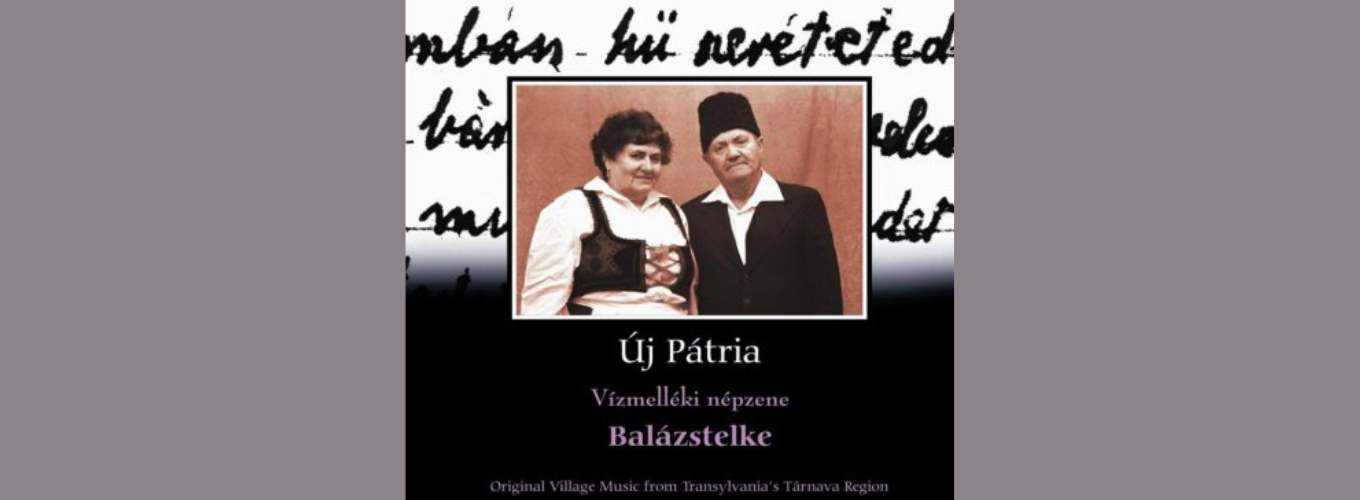
Balázstelke - Original Village Music from Transylvania’s Târnava Region
The Fogarasi siblings, István and Katalin, learned the songs from their mother, who sang melodies while she was weaving in the evenings. “If we heard a song that we hadn’t known before, we learned and memorised it……we also added a little bit to it…..then we sang it in such a way that it would sound good.”
Their grandfather was a great dancer as well. Dancing and other traditional elements were learned mainly from grandparents, who spent more time with the children than parents. Mrs Vince learned the ballads from her grandmother who never actually called them ballads.
Some of the traditions are learned almost unnoticed, as they are passed down from one generation to the next, but others are consciously taught as the younger generation is prepared to meet the expectations of the village community.
1. Keserű víz, nem hittem, hogy édes légy (Lassú – Slow Hungarian csárdás) 2’27”
2. Fehér fuszulykavirág (Lassú – Slow Hungarian csárdás) 2’54”
3. Este kialszik a lámpa (Szökő – Fast Hungarian csárdás) 1’35”
4. Balázstelki viola (Lassú – Slow Hungarian csárdás) 0’39”
5. Kútágosra szállott a sas (Lassú – Slow Hungarian csárdás) 3’01
6. Édesanyám mondta nékem (Sűrű verbunk vagy nagylépés –
Fast Hungarian men’s dance) 2’20”
7. Édesanyám mondta nékem (Lassú – Slow Hungarian csárdás) 1’51”
8. Csárdás 1’00”
9. Balázstelki nagy hegy alatt (Féloláhos – Hungarian turning csárdás) 1’37”
10. Szökő (Fast Hungarian csárdás) 1’09”
11. Ha elmegyek, meglássátok (Lassú – Slow Hungarian csárdás) 2’49”
12. Szerettelek, babám, nagyon (Lassú – Slow Hungarian csárdás) 4’42”
13. Szeress, babám, de nézd meg, kit (Lassú – Slow Hungarian csárdás) 2’09”
14. Ezé’ maradatt a magyar szegényebbnek
(Táncos monda – Etiological legend) 0’54”
15. Învârtita (Romanian turning dance) 3’52”
16. Haţegana (Fast Romanian csárdás) 2’36”
17. Kísérj ki, babám, síromig (Asztali nóta – Hungarian table song) 4’43”
18. Édesanyám sok szép szava (Lassú – Slow Hungarian csárdás) 2’56”
19. Kinek nincsen szeretője, babája (Cigány dal – Gypsy song in Hungarian) 1’02”
20. Seprik az erdei utat (Regrutanóta – Hungarian new recruits’ song) 3’01”
21. Mikor mentem a faluból kifelé
(Regrutanóta – Hungarian new recruits’ song) 2’56”
22. Megöltek egy legént (Ballada – Hungarian ballad) 1’55”
23. Fehér László lovat lopott (Ballada – Hungarian ballad) 3’19”
24. Keserű víz, nem hittem, hogy édes légy
(Asztali nóta – Hungarian table song) 4’00”
25. Szóljon, édesanyám, bár egy szót (Sirató – Hungarian lament) 1’02”
26. Éde’ lelkem, éde’ lelkem (Sirató – Hungarian lament) 0’56”
27. Măicuţa mē’ ai’ frumoasă (Román sirató – Romanian lament) 0’28”
28. Édesanyám sok szép szava (Asztali nóta – Hungarian table song) 3’24”
29. Túl a vizen van egy malam (Lassú – Slow Hungarian csárdás) 4’26”
Összidő (Total time) 70’24”
Válogatta / Selected by: Pávai István
ADATKÖZLŐK / PERFORMERS – INFORMANTS
VERES Andrásné FOGARASI Katalin (Balázstelke, 1942)
ének / voice (1–2., 4–7., 9., 11–12., 17., 19–21., 24–25., 28–29.)
tánc / dance (7–10., 14–16.), mesélés / story-telling (14.)
FOGARASI István (Balázstelke, 1928)
ének / voice (1., 4, 6–7., 9., 11., 17., 20., 24.), tánc / dance (7–10.)
VINCÉNÉ RÁDULY Irma (Balázstelke, 1953)
ének / voice (3., 13., 18., 21–23., 26–27.), tánc (15–16.)
VERES András (Balázstelke, 1937)
ének (19., 21.), csujogatás / rhythmic shouts (15.), tánc / dance (14., 16.)
VERES János (Balázstelke, 1941)
ének / voice (21.), tánc / dance (15–16.)
KÁLÓ „Cuppa” József (Héderfája, 1943)
hegedű / violin (1–2., 4., 6–12., 17., 20., 24., 29.)
JÁMBOR „Dumnyezó” István (Csávás, 1951)
hegedű / violin (3., 5., 13–16., 18., 21., 23., 28.)
CSÁNYI Sándor „Cilika” (Csávás, 1959)
hegedű / violin (3., 5., 13., 18., 21., 28)
MEZEI Ferenc „Csángáló” (Csávás, 1951)
háromhúros kontra / 3-stringed viola (1–3., 5–18., 20–21., 23–24., 28–29.)
MEZEI „Policer” Pál (Csávás, 1961)
bőgő / double bass (1–3., 5–18., 20–21., 23–24., 28–29.)